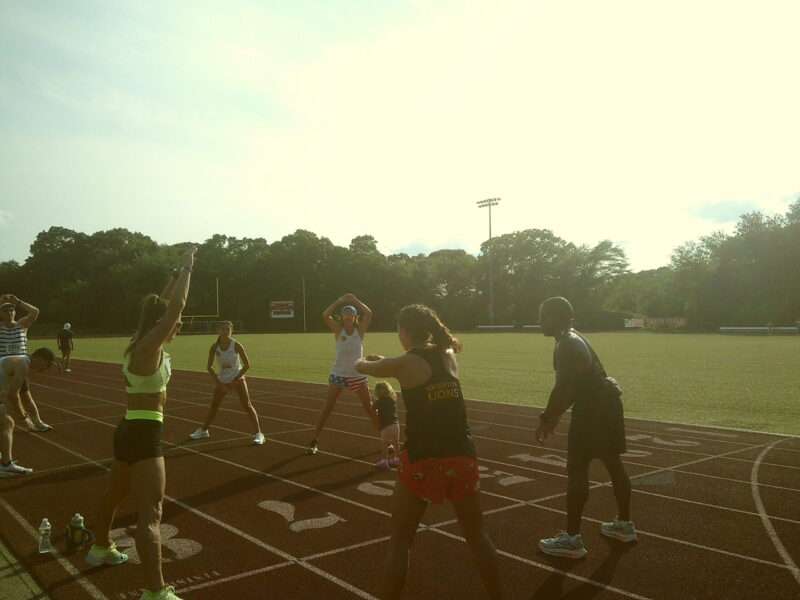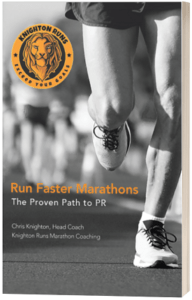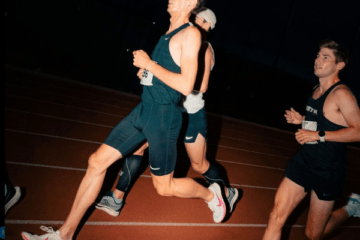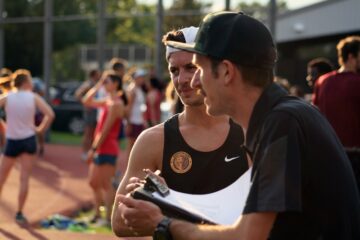How do you train for Track Running Events?
Learn the four phases of distance track running training!
By Coach Chris Knighton

Disclosure: This article may contain affiliate links. When you buy through links on our site, I may earn an affiliate commission. As an Amazon Associate, I earn from qualifying purchases.
Training for Track Running Events
Are you interested in training for track running events?
Lately I’ve been working on my second book, Ageless Track Star: How to Become a Masters Track Runner in Your 30’s, 40’s, or 50’s.
My main goal with this book is to encourage adult road runners to try out track racing for the first time.
You may have seen at the Paris 2024 Olympics that Team USA did incredible. We took home 34 medals, including 14 gold! It was the most track and field medals Team USA has earned since 1984.
Did you know there is an exciting world of track racing available to normal adults like us too?
In this blog post, I will share with you the basic structure of what a track training plan looks like.
Use this information to decide if training for track running events is something you’d like to take on!
At the bottom of this post, I have several ways you can get started with your training today.
Phases of a Track Training Plan
1. Base Building Phase
2. Strength Building Phase
3. Race-Specific Training Phase
4. Competitive Phase
Phase 1 – Base Building Phase
The first phase of track training focuses on building mileage and establishing a weekly framework for your training.
Develop sustainable habits now that you can maintain and build upon in the challenging months ahead.
Build up to running 5-6 days per week, grow your mileage over time, begin to include supplemental strength training, and carve out time for self-care. Your running during this phase will consist almost entirely of easy, “conversational pace” mileage. You will go further and faster in your track season if you do not push during this time and instead focus on building mileage higher.
The Base Building Phase is typically 4 to 8 weeks long and should be extended if you have more time available to build base mileage.
Key Workouts
– Easy Runs
– Strides
– Short Hills
– Unstructured Light Fartleks
Phase 2 – Strength Building Phase
The second phase of track training focuses on improving your endurance at faster speeds. This is commonly referred to as “strength” in track running. Your weekly mileage and length of your long runs will continue to increase during this phase, however, place your focus on the endurance building workouts.
The Strength Building Phase is typically 4 to 6 weeks long.
Key Workouts
– Broken Tempo Runs (Repeats of 400m, 800m, 1000m, 1600m, etc with short rest)
– Hill Workouts: Including hill repeats to build strength and power.
– Strides
– Long Run
– Short Intervals at Race Pace.
Phase 3 – Race-Specific Training Phase
The third phase of track training focuses on the specific demands of your goal race (e.g., 800m, 1-mile, or 5000m).
Most athletes will reach their highest mileage and then hold it consistently in this phase until they reach the competitive phase of training. However, emphasis should be placed on quality workouts over high mileage.
Key Workouts
– Longer Intervals at Race Pace
– Specific Tempo Runs
– Daily Strides
Phase 4 – Competitive Phase
This is the phase of training where you will reach your peak fitness and compete in your season’s most important races.
This could be as short as 2 weeks long if you are peaking for one goal race, in which case you could follow a taper strategy similar to that employed by marathoners, or it could last as long as month if you will be competing in multiple equally important races during that time.
During this phrase, you should reduce your mileage and place your emphasis on short but quality, race-specific workouts to allow you to reach a peak level of fitness and feel freshest for your key workouts.
While a brief period of reduced, but specific training will allow you to reach peak fitness when it follows a long block of heavy training, after about a month of reduced mileage, you will likely begin to start to losing some fitness, mental readiness, and may encounter doubts creeping in. Therefore it is best to keep the competitive phase as short as possible while staying in line with your goals for the season.
Key Workouts
– Tune-Up Workouts
– Daily Strides
– Goal Races which Build Upon Each Other
How to Get Started Training for Track Racing Today
Would you like to try focusing on track training for your next running cycle?
Here are two ways I can help you out today:
1. Grab my 5-week “Run Your Fastest Mile Program” here to get a taste of track training.
2. I’m looking to bring on a few 1:1 coached athletes over the next month who want to focus on track training. Would you be interested in working together? Please apply for coaching here to let me know!
Until next time… happy running!


